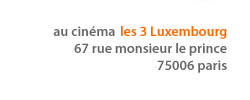
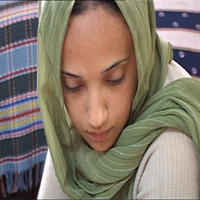
Screening date : 25-11-2007 -- 15h30
Badal
Umm Wajih, the filmmaker's aunt, gave her ten sons and daughters in marriage according to the « badal » system, in which a brother and a sister of one family marry the sister and brother of another family. The film was shot in Umm Wajih's courtyard, where she lives with her sons and their families.
Umm Wajih is at present looking for a "badal" match for Wajih, her eldest son, a forty-two-year-old widower, and her twenty-one-year-old daughter Miada – an unusual arrangement indeed. Through the story of the girls in Umm Wajih's yard, the director examines how women partake in the oppression of other women.
Umm Wajih is at present looking for a "badal" match for Wajih, her eldest son, a forty-two-year-old widower, and her twenty-one-year-old daughter Miada – an unusual arrangement indeed. Through the story of the girls in Umm Wajih's yard, the director examines how women partake in the oppression of other women.
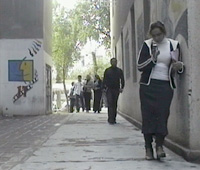
Screening date : 23-11-2007 -- 13h30
Baghdad Days
A young woman from Kirkuk, returns to Baghdad after the war, to finish her studies at the Academy of Fine Arts. The film is the director's diary of her year as she tries to find a place to live, looks for work, graduates from college, deals with family problems and struggles to come to terms with her position as a woman on her own.
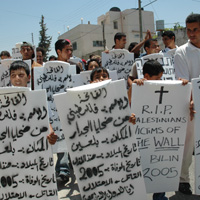
Screening date : 21-11-2007 -- 13h30
Bil'in My Love
The Palestinian village of Bil'in is about to lose over a half of its territory to Israel. The residents of the village decide to embark on a struggle against the construction of the barrier.
The film exposes the extraordinary relationship formed between the villagers and Shai, the director, who arrives with a group of Israeli peace activists and the conflict that arises between him, as a former soldier and the entire military organization.
The film exposes the extraordinary relationship formed between the villagers and Shai, the director, who arrives with a group of Israeli peace activists and the conflict that arises between him, as a former soldier and the entire military organization.
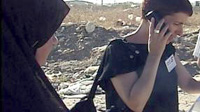
Screening date : 25-11-2007 -- 15h30
Can You Hear Me?
Israeli and Palestinian women fight for peace.
The documentary explores the in-depth role of Israeli and Palestinian women, peace activists dealing with one of the world's oldest conflicts…
The documentary explores the in-depth role of Israeli and Palestinian women, peace activists dealing with one of the world's oldest conflicts…
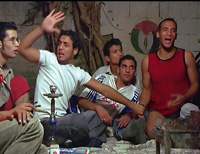
Screening date : 26-11-2007 --13h30
Chacun sa Palestine (My Palestine)
Sabrina, Rawad, Said and other young Palestinian refugees born in Lebanon enter the photographer's studio one at a time. The rules of the game are simple. Each one selects one photo background from among the different views of mythical cities: New York, Paris, Beirut and Jerusalem.
Each one then tells his story, his projects, and his own questioning. They all share a certain nostalgia for a land they do not - and perhaps will never - know: Palestine.
Each one then tells his story, his projects, and his own questioning. They all share a certain nostalgia for a land they do not - and perhaps will never - know: Palestine.

